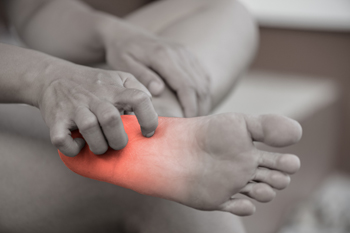
Neuropathy is nerve damage. It is a common condition among diabetic patients, which can happen as a result of elevated glucose levels in the blood. Recent studies have shown that about 60 percent of neuropathy cases in the United States are linked to diabetes. The feet are often affected, and the inability to feel existing cuts and scrapes may lead to developing a foot ulcer. The symptoms that often accompany this condition can include a numbing or tingling sensation, and the muscles can feel weak. Developing neuropathy may also be connected to chronic alcoholism, HIV, or AIDS, and there are cancer patients that may have this condition. A deficiency of vitamins B12 or A may cause neuropathy to occur, in addition to eating foods that have toxins. A diagnosis is generally needed to confirm this condition, which consists of having a blood test taken or possibly a skin biopsy performed. If you have numbness in your feet, it is suggested that you contact a podiatrist as quickly as possible who can properly diagnose and treat neuropathy.
Neuropathy
Neuropathy can be a potentially serious condition, especially if it is left undiagnosed. If you have any concerns that you may be experiencing nerve loss in your feet, consult with Dr. Richard DiMario from Maine. Our doctor will assess your condition and provide you with quality foot and ankle treatment for neuropathy.
What Is Neuropathy?
Neuropathy is a condition that leads to damage to the nerves in the body. Peripheral neuropathy, or neuropathy that affects your peripheral nervous system, usually occurs in the feet. Neuropathy can be triggered by a number of different causes. Such causes include diabetes, infections, cancers, disorders, and toxic substances.
Symptoms of Neuropathy Include:
Those with diabetes are at serious risk due to being unable to feel an ulcer on their feet. Diabetics usually also suffer from poor blood circulation. This can lead to the wound not healing, infections occurring, and the limb may have to be amputated.
Treatment
To treat neuropathy in the foot, podiatrists will first diagnose the cause of the neuropathy. Figuring out the underlying cause of the neuropathy will allow the podiatrist to prescribe the best treatment, whether it be caused by diabetes, toxic substance exposure, infection, etc. If the nerve has not died, then it’s possible that sensation may be able to return to the foot.
Pain medication may be issued for pain. Electrical nerve stimulation can be used to stimulate nerves. If the neuropathy is caused from pressure on the nerves, then surgery may be necessary.
If you have any questions, please feel free to contact our office located in York, ME . We offer the newest diagnostic and treatment technologies for all your foot care needs.